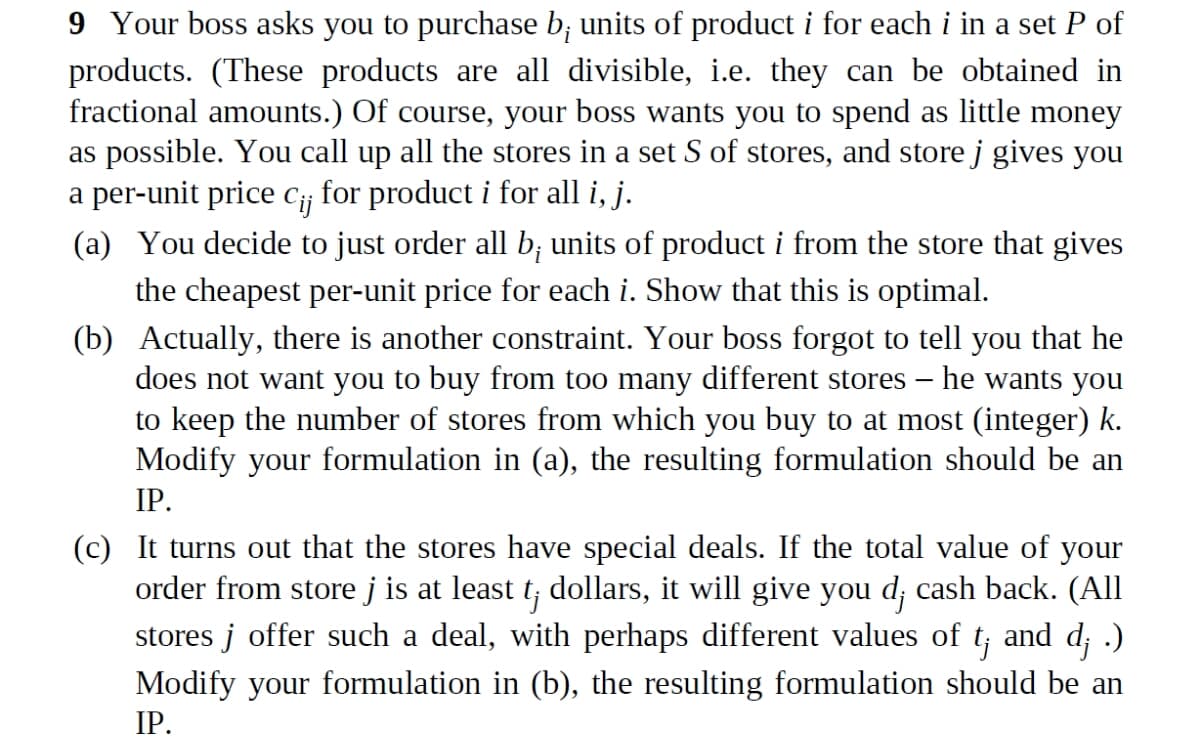Chapter6: Demand Relationships Among Goods
Section: Chapter Questions
Problem 6.5P
Related questions
Question

Transcribed Image Text:9 Your boss asks you to purchase b; units of product i for each i in a set P of
products. (These products are all divisible, i.e. they can be obtained in
fractional amounts.) Of course, your boss wants you to spend as little money
as possible. You call up all the stores in a set S of stores, and store j gives you
a per-unit price C¡¡ for product i for all i, j.
(a) You decide to just order all b; units of product i from the store that gives
the cheapest per-unit price for each i. Show that this is optimal.
(b) Actually, there is another constraint. Your boss forgot to tell you that he
does not want you to buy from too many different stores – he wants you
to keep the number of stores from which you buy to at most (integer) k.
Modify your formulation in (a), the resulting formulation should be an
IP.
(c) It turns out that the stores have special deals. If the total value of your
order from store j is at least t; dollars, it will give you d; cash back. (All
stores j offer such a deal, with perhaps different values of t;
and d¡ .)
Modify your formulation in (b), the resulting formulation should be an
IP.
Expert Solution
This question has been solved!
Explore an expertly crafted, step-by-step solution for a thorough understanding of key concepts.
Step by step
Solved in 4 steps with 3 images

Knowledge Booster
Learn more about
Need a deep-dive on the concept behind this application? Look no further. Learn more about this topic, economics and related others by exploring similar questions and additional content below.Recommended textbooks for you


Brief Principles of Macroeconomics (MindTap Cours…
Economics
ISBN:
9781337091985
Author:
N. Gregory Mankiw
Publisher:
Cengage Learning

Essentials of Economics (MindTap Course List)
Economics
ISBN:
9781337091992
Author:
N. Gregory Mankiw
Publisher:
Cengage Learning


Brief Principles of Macroeconomics (MindTap Cours…
Economics
ISBN:
9781337091985
Author:
N. Gregory Mankiw
Publisher:
Cengage Learning

Essentials of Economics (MindTap Course List)
Economics
ISBN:
9781337091992
Author:
N. Gregory Mankiw
Publisher:
Cengage Learning

Principles of Economics 2e
Economics
ISBN:
9781947172364
Author:
Steven A. Greenlaw; David Shapiro
Publisher:
OpenStax